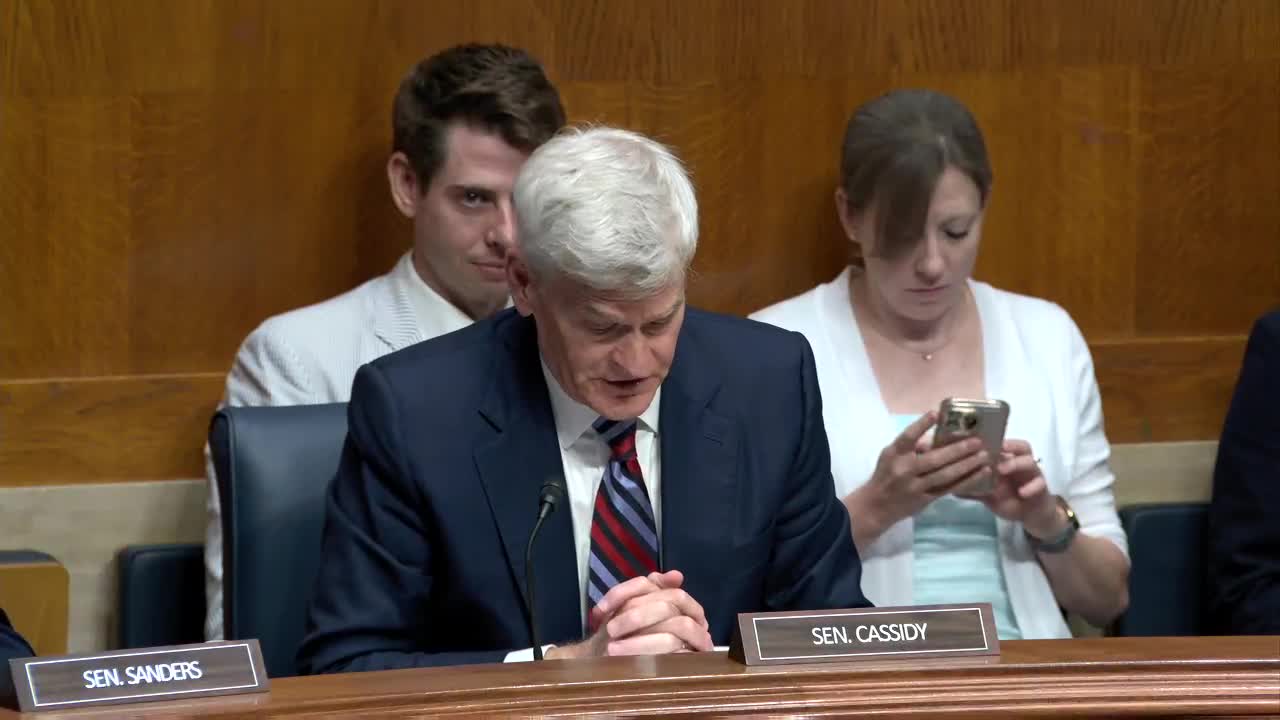Healthcare Expert Calls for Transparency Amid Rising New Jersey Insurance Premiums
July 31, 2025 | Health, Education, Labor, and Pensions: Senate Committee, Standing Committees - House & Senate, Congressional Hearings Compilation
This article was created by AI summarizing key points discussed. AI makes mistakes, so for full details and context, please refer to the video of the full meeting. Please report any errors so we can fix them. Report an error »

The U.S. Senate Committee on Health, Education, Labor, and Pensions convened on July 31, 2025, to discuss critical strategies for making health care more affordable and empowering patients. The meeting highlighted the urgent need for transparency in the health care system, a theme emphasized by several experts, including a former director of state health benefits for New Jersey.
The expert, who has extensive experience in health insurance, underscored the alarming trend of rising health care costs that outpace wages and inflation. He noted that many employers and families are struggling with skyrocketing premiums, citing a staggering 115% increase in premiums for members of the New Jersey Police Benevolence Association over the past five years. The cost of family coverage has reached over $67,000, with employees contributing $23,000 annually from their paychecks.
Central to the discussion was the concept of transparency, which the expert described as essential for fostering affordability, competition, and accountability in health care. He argued that without clear visibility into pricing and financial incentives, stakeholders cannot effectively address the underlying issues driving costs. He called for hospitals to provide standardized and usable pricing information and for stronger enforcement of existing transparency regulations.
The expert also pointed out significant gaps in access to claims data for employers, who are often left in the dark about the costs they incur. Despite a ban on "gag clauses" in 2021, many health care providers and insurers continue to restrict access to crucial claims information, hindering employers' ability to manage their health plans effectively. This lack of transparency prevents employers from leveraging their purchasing power on behalf of the 165 million Americans covered by employer-sponsored insurance.
The meeting raised critical questions about the reluctance of health care industry insiders to operate transparently. The expert noted that the blurred lines between buyers and sellers in the health care market complicate negotiations and obscure true costs. He emphasized that without access to comprehensive data and disclosure, efforts to reform health care will be severely limited.
The discussions at this meeting reflect a growing recognition of the need for systemic change in the health care industry to ensure affordability and empower patients. As the committee continues to explore solutions, the call for transparency remains a pivotal focus in the quest for a more equitable health care system.
The expert, who has extensive experience in health insurance, underscored the alarming trend of rising health care costs that outpace wages and inflation. He noted that many employers and families are struggling with skyrocketing premiums, citing a staggering 115% increase in premiums for members of the New Jersey Police Benevolence Association over the past five years. The cost of family coverage has reached over $67,000, with employees contributing $23,000 annually from their paychecks.
Central to the discussion was the concept of transparency, which the expert described as essential for fostering affordability, competition, and accountability in health care. He argued that without clear visibility into pricing and financial incentives, stakeholders cannot effectively address the underlying issues driving costs. He called for hospitals to provide standardized and usable pricing information and for stronger enforcement of existing transparency regulations.
The expert also pointed out significant gaps in access to claims data for employers, who are often left in the dark about the costs they incur. Despite a ban on "gag clauses" in 2021, many health care providers and insurers continue to restrict access to crucial claims information, hindering employers' ability to manage their health plans effectively. This lack of transparency prevents employers from leveraging their purchasing power on behalf of the 165 million Americans covered by employer-sponsored insurance.
The meeting raised critical questions about the reluctance of health care industry insiders to operate transparently. The expert noted that the blurred lines between buyers and sellers in the health care market complicate negotiations and obscure true costs. He emphasized that without access to comprehensive data and disclosure, efforts to reform health care will be severely limited.
The discussions at this meeting reflect a growing recognition of the need for systemic change in the health care industry to ensure affordability and empower patients. As the committee continues to explore solutions, the call for transparency remains a pivotal focus in the quest for a more equitable health care system.
View full meeting
This article is based on a recent meeting—watch the full video and explore the complete transcript for deeper insights into the discussion.
View full meeting